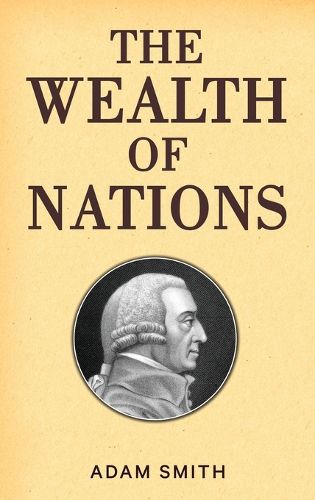Readings Newsletter
Become a Readings Member to make your shopping experience even easier.
Sign in or sign up for free!
You’re not far away from qualifying for FREE standard shipping within Australia
You’ve qualified for FREE standard shipping within Australia
The cart is loading…






This title is printed to order. This book may have been self-published. If so, we cannot guarantee the quality of the content. In the main most books will have gone through the editing process however some may not. We therefore suggest that you be aware of this before ordering this book. If in doubt check either the author or publisher’s details as we are unable to accept any returns unless they are faulty. Please contact us if you have any questions.
The Wealth of Nations offers one of the world's first connected accounts of what builds nations' wealth, and has become a fundamental work in classical economics.
It influenced a number of authors and economists, as well as governments and organizations. Alexander Hamilton was influenced in part by The Wealth of Nations to write his Report on Manufactures, in which he argued against many of Smith's policies. Interestingly, Hamilton based much of this report on the ideas of Jean-Baptiste Colbert, and it was, in part, Colbert's ideas that Smith responded to with The Wealth of Nations. Many other authors were influenced by the book and used it as a starting point in their own work, including Jean-Baptiste Say, David Ricardo, Thomas Malthus and, later, Ludwig von Mises.
The Wealth of Nations was the product of seventeen years of notes and earlier studies, as well as an observation of conversation among economists of the time concerning economic and societal conditions during the beginning of the Industrial Revolution, and it took Smith some ten years to produce. It provided the foundation for economists, politicians, mathematicians, and thinkers of all fields to build upon. Irrespective of historical influence, The Wealth of Nations represented a clear paradigm shift in the field of economics, comparable to what Immanuel Kant's Critique of Pure Reason was for philosophy.
$9.00 standard shipping within Australia
FREE standard shipping within Australia for orders over $100.00
Express & International shipping calculated at checkout
This title is printed to order. This book may have been self-published. If so, we cannot guarantee the quality of the content. In the main most books will have gone through the editing process however some may not. We therefore suggest that you be aware of this before ordering this book. If in doubt check either the author or publisher’s details as we are unable to accept any returns unless they are faulty. Please contact us if you have any questions.
The Wealth of Nations offers one of the world's first connected accounts of what builds nations' wealth, and has become a fundamental work in classical economics.
It influenced a number of authors and economists, as well as governments and organizations. Alexander Hamilton was influenced in part by The Wealth of Nations to write his Report on Manufactures, in which he argued against many of Smith's policies. Interestingly, Hamilton based much of this report on the ideas of Jean-Baptiste Colbert, and it was, in part, Colbert's ideas that Smith responded to with The Wealth of Nations. Many other authors were influenced by the book and used it as a starting point in their own work, including Jean-Baptiste Say, David Ricardo, Thomas Malthus and, later, Ludwig von Mises.
The Wealth of Nations was the product of seventeen years of notes and earlier studies, as well as an observation of conversation among economists of the time concerning economic and societal conditions during the beginning of the Industrial Revolution, and it took Smith some ten years to produce. It provided the foundation for economists, politicians, mathematicians, and thinkers of all fields to build upon. Irrespective of historical influence, The Wealth of Nations represented a clear paradigm shift in the field of economics, comparable to what Immanuel Kant's Critique of Pure Reason was for philosophy.